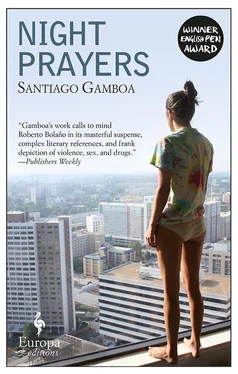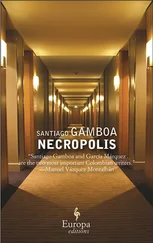That’s what my life was like, but one day something happened.
One night I went out onto the street and walked as far as the open sewer on 106th, a stinking trickle of water that crossed our neighborhood and sometimes, when it rained a lot, turned into a river. I liked to go there to watch the water flow, even though it was dirty water. On one side of the sewer there was a park with a few trees separating it from the houses, and on the other a wall about a hundred feet long and twelve feet high, with bars on the top. For years I’d stopped in that place, attracted by something. The sewer, the wall. I’d pass it and stop there. I’d lean over the bridge and look, I didn’t really know why. In the evenings there were people smoking grass between the trees or couples necking. Garbagemen taking a nap on the lawns. I’d look and look: at the sewer, the wall.
I only found out by chance. My sister’s class had been making huge cardboard models of mountains, and to paint them they’d used colored spray paints. Days later I found the box of cans in the garage and took it to my room. I looked at them for a while and chose three, one yellow, one black, one red. And I went out onto the street, Consul. There was a cool wind, the air smelled damp, as if it was going to rain, but the sky wasn’t very heavy. I walked as far as the park, jumped over the sewer, and stopped in front of the wall. I looked at it for a second, grabbed the can of black paint, shook it, and heard the little ball in the can, a sound that sent a quiver through me and made me feel dizzy. I looked at the wall and traced a straight line, about twelve feet long, and then a second one parallel to it. With the yellow can I made a thick wave and with the red filled the spaces that were left, like pregnant bellies. I stepped back and contemplated what I’d done. I was moved. I went back to the wall and painted curved arrow tips and a yellow shadow, and the colors, as they were superimposed, gave off a strange glow. I ran back to the house for the green and blue cans and added a kind of bubble to that strange figure, which now looked like a snake slithering through a tunnel, and when I’d finished, moving back to the edge of the sewer to get a good look at it, under the yellowish light of the lamppost, I felt it should be signed, so I wrote MAL in red. I didn’t dare put my full name, I took three letters out. From the L I traced a curved line below the word, like a floating ribbon, and felt euphoric, I took a deep breath and said to myself, how will it look in the morning? how will I see it in the morning? I went back home and put the cans away. I washed my hands with soap and got nervously into bed. That night I dreamed about remote desert islands, filled with virgin walls crying out to be painted.
The story I want to write, the one I’m now about to tell — the one I’m remembering and putting into some kind of shape here in Bangkok — happened at a strange time in my life.
In those years I was working for the diplomatic service and had recently moved to New Delhi, a city that seemed quite unconventional to a Latin American, which was why, or at least so I believed, it required a somewhat adventurous frame of mind. That’s how I thought in those days. I had spent a lot of time in Europe — twenty-four years! — telling myself that if I’d actually been a daring kind of person — as I wanted and even believed myself to be — I should long ago have moved somewhere tougher and more remote, like Beijing, Jakarta, or Nairobi.
Having spent a lot of time completing my education, then searching for stability and reaching a certain level, I was now ready to go out and lose myself, lose what I had acquired or swap it for new experiences. That’s why, when I was offered the post of consul in my country’s embassy in India, I didn’t hesitate for a second, but got ready to abandon sad old Europe.
Arriving in Delhi and seeing the comfort in which foreigners lived — including the diplomats of our neighboring countries — I had high hopes, but the illusion only lasted until I found out what my salary amounted to, a figure that tact forbids me from specifying, as Julio Ramón Ribeyro would say, and one that didn’t even allow me to dream of the traditional areas where expatriates lived, like Vasant Vihar, Sundar Nagar, or Nizzamudin East. Instead, I had to go somewhere cheaper, a middle-class area called Jangpura Extension, which struck me at first as dusty and a bit terrifying but which in the end, as often happens, I grew to love. A person can get used to anything, even the fact that two hundred yards from his home there’s a corner filled with noisy rickshaws, sleeping dogs, clapped-out taxis, a foul urinal swarming with mosquitoes, and fried food stands that are like factories for typhoid or dysentery.
The offices of the embassy were in Vasant Vihar, a rich neighborhood, although one filled with dust and having the disadvantage of being just below the flight path of planes coming in to land at Indira Gandhi International Airport, which meant that every three minutes you had to shout in order to be heard indoors.
And that wasn’t all: the front of the building faced Olof Palme Marg, where bulldozers and cranes spent an absurdly long time building an overpass — a flyover in Indian English — producing mountains of dust, the noise of pneumatic drills, and the horrific smells of drains, not to mention the traffic jams. It reached a peak one afternoon when, perhaps because of all the digging to lay the concrete, a snake some seven feet in diameter crossed Olof Palme Marg and reached the doors of the embassy, where it died, crushed by the wheels of a truck, whose driver, of course, stopped, took his head in both hands, and wept, since in India all life is sacred.
My office was on the second floor, with a view of the gardens of a dusty residence that was the embassy of the Arab Emirate of Bahrain; every time I looked through the window or went out onto my magnificent balcony I would see two guards and a dog snoozing in the sentry boxes, and a bit farther on, out on the street, groups of women in saris carrying bricks in baskets on their heads to a nearby site where their husbands were working and their children were playing amid the rubble and earth.
The principal task of the consular office was to issue visas, to Indian businessmen going to Colombia to make deals, to technicians, to students, and — rarely — to tourists. We also had to process documents from the National Tax Office legalizing the invoices of companies from India, Bangladesh, and Pakistan, and even from Iran, Myanmar, Sri Lanka, and Nepal, countries where we had no diplomatic representation but whose affairs we handled. On request, the companies had to send the originals of the documents and their registration by a chamber of commerce, everything duly authenticated and translated before a notary.
And naturally there were problems and requests involving our compatriots, of whom there were only a hundred and twenty in the whole country — one for every ten million Indians — plus visitors, those who came to India and got into all kinds of trouble, most of them through having a romantic and distorted image of the country.
My colleague, Olympia León de Singh, was a woman in her early fifties who had been working there for more than ten years and knew the ins and outs of the “consular function” as nobody else did. In addition, she was the only Colombian in the mission who spoke Hindi, since she was married to a Sikh and had lived in Delhi for more than twenty years. When I asked her, she told me she had met her husband in Moscow in the 1970s, at Patrice Lumumba University, where both were studying international relations. Her stories, which she kept feeding me in snippets and only when she was in a good mood, were amazing. She told me that at the beginning of the 1980s the embassies brought in toilet paper in diplomatic bags, since you couldn’t get hold of it in India, and that at the airport, during stopovers, crowds of cripples and sick people would invade the runway and get on the planes to beg!
Читать дальше












